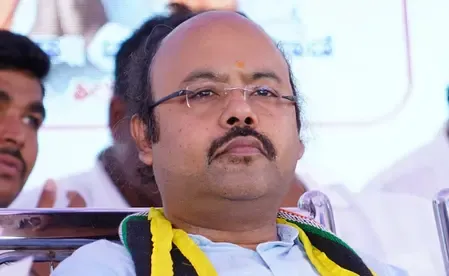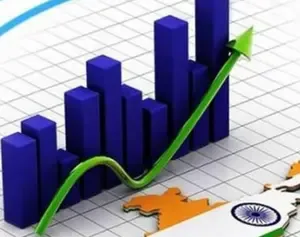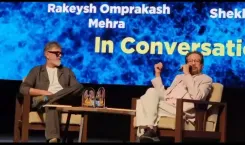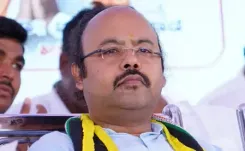Israeli Ambassador Reuven Azar Acknowledges PM Modi's Support After October 7 Hamas Attack
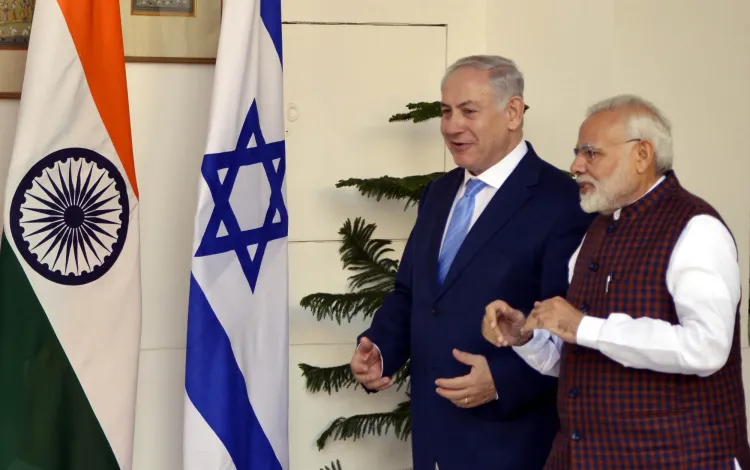
Synopsis
Key Takeaways
- PM Modi was the first leader to call after the October attack.
- Over 1200 people died and 250 were taken hostage in the attack.
- The partnership between India and Israel spans defense, agriculture, and technology.
- There is a shared vision between both nations for regional stability.
- Israel's military advancements could benefit India significantly.
New Delhi, Feb 26 (NationPress) Expressing gratitude to Prime Minister Narendra Modi for his enduring friendship and unwavering support for Israel, Reuven Azar, the Israeli Ambassador to India, disclosed that Modi was the first global leader to reach out to Israeli officials after the tragic Hamas terror attack on October 7, 2023.
During this devastating event, more than 1200 individuals lost their lives in Israel, and approximately 250 were taken hostage.
"We genuinely admire the progress India has made under Prime Minister Modi's guidance. His friendship is invaluable to us. He was the first to reach out to us following the events of October 7. Over the past year and a half, he has consistently stood by us. Our perspectives align on numerous issues, and we face similar challenges. I am optimistic that in the years ahead, we will achieve even greater collaboration," Azar shared in an exclusive interview with IANS.
He also discussed the ongoing situation in Gaza, the ceasefire, support from the current US administration, and various other topics.
Interview Excerpts:
IANS: As Israeli PM Benjamin Netanyahu mentioned recently, this marks a "historic turning point" for Israel. What are your thoughts?
Reuven Azar: Absolutely, this represents a critical juncture in our history. We have not only survived but also delivered a decisive response to the attack on October 7. The atrocities of Hamas, coupled with the threats posed by Iranian proxies, have been met with significant military action. We have significantly diminished the threat from Hezbollah and disrupted Iranian missile capabilities. This success provides an opportunity for peace and stability.
IANS: How is the situation in Gaza currently?
Reuven Azar: We have successfully recovered most hostages, leaving around 69 remaining, half of whom are deceased. We have returned nearly 190 hostages and remain committed to recovering all hostages while ensuring the destruction of Hamas as a military threat and governmental force in Gaza.
IANS: What are your thoughts on President Donald Trump's proposal to relocate people from Gaza?
Reuven Azar: The situation in Gaza is unique. In various conflict zones, people are permitted to seek refuge until stability returns, but this does not apply to Gaza. The President's suggestion to offer temporary relocation for Gazans is a natural approach, emphasizing voluntary relocation to safe havens.
IANS: How does the Trump administration differ from the Biden administration?
Reuven Azar: We are hopeful because of the achievements of the first Trump administration, including the Abraham Accords. Israel gained significant recognition, such as the acknowledgment of Jerusalem as our capital and the recognition of our sovereignty over the Golan Heights. We anticipate similar advancements under the current Trump administration.
IANS: President Trump has raised concerns about USAID funding...
Reuven Azar: America must determine its involvement in global affairs. We do not interfere in that decision. We have not observed USAID toppling governments, but rather the misuse of funds by various agencies.
IANS: Are you worried about media coverage of the conflict?
Reuven Azar: Yes, the portrayal of the Middle East is often biased. Certain networks spread propaganda for radical Islamists, complicating the situation. Some Western outlets also exhibit bias, and terrorist organizations often masquerade as journalists.
IANS: What would you say to supporters of radical Islamists?
Reuven Azar: We possess a significant advantage: we cherish life more than they embrace death. Our commitment to life drives us to protect our nation and families.
IANS: Is Hamas a threat to India due to its connections in Pakistan?
Reuven Azar: Terrorist organizations often collaborate, posing threats beyond our region. Recent meetings in Pakistan involving Hamas leaders highlight this cooperation.
IANS: What advice do you have for Indian leaders supporting the Palestinian cause?
Reuven Azar: I do not presume to advise anyone. We share a common goal of peace. Those ready to recognize our right to self-determination can negotiate peace with us.
IANS: How significant is the India-Israel partnership?
Reuven Azar: Our partnership is remarkable, with shared values of development, entrepreneurship, and innovation. We are collaborating on defense, agriculture, and technology, paving the way for future growth.
IANS: What impact would India's acquisition of F-35 jets have?
Reuven Azar: Advanced military technology is crucial. Israel's F-35 squadrons have established air superiority, and India's potential acquisition would similarly enhance its military capabilities.
IANS: How do you assess India's balanced diplomatic approach?
Reuven Azar: Diplomacy requires balance. India's support has been commendable, demonstrating that strong relations with us do not compromise ties with other nations.
IANS: India and Israel are collaborating on connectivity initiatives.
Reuven Azar: Effective trade logistics are vital. India's connectivity efforts are commendable, and we wish to participate, ensuring strategic stability in our region.
IANS: How do you perceive Prime Minister Modi's leadership?
Reuven Azar: We admire India's progress under Modi. His support during challenging times has been invaluable, and we are poised for deeper collaboration.
IANS: How special is the India-Israel partnership across various sectors?
Reuven Azar: Our defense cooperation is pioneering, with joint ventures and production initiatives underway. Israel's agricultural technologies have significantly benefitted Indian farmers, contributing to food security.


